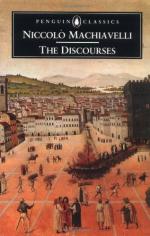
|
| Name: _________________________ | Period: ___________________ |
This quiz consists of 5 multiple choice and 5 short answer questions through Book One, The Development of Rome's Constitution, Sundry Reflections on the Kings of Rome, The Introduction of New Forms of Government, Ingratitude.
Multiple Choice Questions
1. How did Machiavelli begin the preface to "The Discourses"?
(a) With advice to two friends on how to keep their friends close and their enemies closer.
(b) As a letter to two political thinkers from Florence.
(c) As a warning to future generations of the tenuous nature of freedom.
(d) As a cynical commentary to the weakness of leaders of his time.
2. What is the main point Machiavelli investigates as he prepares to discuss the affects of strong Princes and weak Princes?
(a) Whether a free state can exist with virtuous Princes.
(b) Whether a free state can exist without laws.
(c) How strict power eliminates corruption and maintains freedom.
(d) Whether a free state (government) can exist in a city that is corrupted.
3. What can be inferred of Machiavelli's view of freedom based upon reading view of weak and strong Princes?
(a) That Machiavelli considered civil rights and individual liberties indispensable to the strength of a city.
(b) That Machiavelli uses the term freedom in reference to the actions of Princes only.
(c) That Machiavelli considers freedom only suited to those who can earn it or buy it.
(d) That Machiavelli is focused on keeping cities free from outside influences rather than individual freedom.
4. What does Machiavelli claim causes ingratitude from a conquered citizenry?
(a) When the conquerors remove freedoms that the citizens knew before being conquered.
(b) Treating conquered citizens harshly.
(c) Taking conquered citizens into slavery.
(d) Taking the property of conquered citizens.
5. How long did Sparta peacefully exist without changing its laws, according to Machiavelli?
(a) Until its domination by Rome.
(b) Through the reign of Lycurgus.
(c) 350 years.
(d) 800 years.
Short Answer Questions
1. What are the two means that Machiavelli identifies as how laws are developed in cities at the beginning of Section 2, Book One.
2. What did Machiavelli cite as the method that Rome used to maintain its freedom?
3. According to Machiavelli in Section 1 of Book One, who are the two types of people who build cities?
4. What did Machiavelli identify as the cause of conspiracy against a hereditary Princes?
5. From what did Machiavelli develop the information that he wrote into "The Discourses"?
|
This section contains 520 words (approx. 2 pages at 300 words per page) |

|




